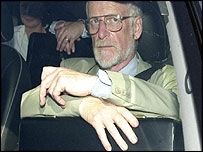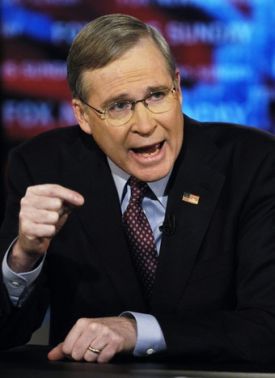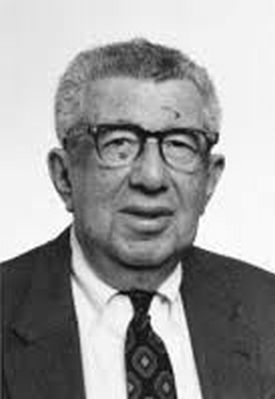The Wages of Spin
From The New CriterionLike the legendary people who have lived beneath a roaring waterfall for so long that they can no longer hear it, media folk are by now so much accustomed to “spin,” the language that they themselves have forced politicians to speak, that they can no longer hear it. Thus as Tim Russert interviewed Terry McAuliffe, chairman of the Democratic National Committee, on a recent Sunday morning on “Meet the Press,” he pointed out to him that every one of the latter’s predictions of Democratic victories in 2002 had turned out to be erroneous. Why then should we believe his sanguine picture of Democratic prospects in 2004? Here is what McAuliffe replied: “I am the national party chairman. I am not going to go on television, you know, three days before an election and say, ‘Oh, no, Tim. No, Mr. Russert, we’re not going to win these elections.’ My job is the chief cheerleader of the party. We’re going to win everything. That’s my job.”
There is an almost endearing quality to such unexpected honesty. Or there would be if it were not so shocking. As when someone candidly confesses that he has lied, our first thought is of the paradox: if you say you lied then, how do we know you’re not lying now? In effect, McAuliffe was telling us that he was lying now — or at least that truth is no part of the concern of “the chief cheerleader of the party,” which comes to pretty much the same thing. The admission also cast an interesting light backwards on his response to the charge of the Republican national chariman, Ed Gillespie, on the same show that the Democratic candidates for president were guilty of “political hate speech” for accusing George W. Bush of, among other things, lying. McAuliffe had replied, in essence, that the Republicans were guilty of making the same charges, or worse, against Democrats.
Most extraordinary of all, however, was the fact that bulldog reporter Tim Russert had nothing to say about any of this — neither the charge of “hate speech” nor the frank admission that respect for the truth was not in the job description of the Democratic National Chairman. Not for him any hopeless attempt to get to the bottom of who was lying, or using “hate speech.” The ease with which he took such charges in his stride suggests to me that, although the media can put on a show of indignation at the idea that a politician may have lied when the opportunity suits for a story — as, for instance, the long-running story designed to suggest that President Bush lied about the Weapons of Mass Destruction in Iraq — really they accept the widely popular but utterly cynical view that “they all do it.” If lying is, as Mr McAuliffe so disarmingly put it, “my job,” what is the point of making an issue of it?
But the seriousness of the charge of bad faith is no less because broad segments of the media have agreed to treat it as routine — or to tell us with a nudge and a wink that political “spin” is an allowable form of dishonesty. This is the lesson of what in Britain has been the big story of the past two months, the Hutton Inquiry into the suicide of Dr. David Kelly. For Americans, this story is what one of my favorite British magazines, The Week, calls “Boring but important.” Dr.Kelly was a civil servant and a prominent scientist with expertise in the field of chemical and biological weaponry who was identified as the principal source for a charge by Andrew Gilligan, a reporter for the BBC that the British government had “sexed up” the intelligence data about Iraq’s weapons of mass destruction in order to justify its support for the war.
Apart from his unauthorized meetings with Mr Gilligan and other BBC journalists, Dr. Kelly’s behavior was exemplary. At first he said he had no idea that he was the source for Mr Gilligan’s sensational story because its details bore no relation to what he had told him. Besides, Gilligan had claimed that his story was based on evidence supplied by a “senior intelligence source,” which Kelly was not. When he realized that Gilligan’s information, such as it was, had come from him — and, as it turned out, him only — he went to his supervisor and told all, which resulted in his being summoned to testify before a parliamentary committee where some rough handling and the prospect of more to come was widely supposed to have induced him to take his own life.
The inquiry, at the time of writing, has produced few surprises. We knew already that Mr Blair’s governing style, like that of every other democratic politician in the world today, relies heavily on “spin” or — precisely — the “sexing up” not just of intelligence data but of every kind of data in order to sell its policies to a mass audience with little interest in the details of the information that goes into the making of policy decisions and less interest in the finer points of the arguments for and against those decisions. The real question to be answered was whether or not spin, in this case, amounted to dishonesty. As we have seen, the media either assumes that it does or pretends to be shocked at the very idea that it might, according as it suits their story. And we also knew already that the BBC’s story, more or less from the beginning, was that the war was a horrible mistake and likely to lead to ghastly consequences — for which, therefore, there could hardly be a justification that was not dishonest.
When Gilligan took his conversation with Kelly and submitted it to a certain amount of “sexing-up” of his own, he thought he had the evidence for what he, along with so many others at the BBC, had known all along, namely that the war was terribly ill-advised. He was hardly the first in the Corporation to report the assumption as the fact, as we learned last spring from a leaked memo by its own defense correspondent, Paul Adams, which loudly complained that his editors’ headlining of “small victories at a very high price” was “exactly the opposite” of the truth. The impact of Gilligan’s report was due entirely to the assumption of scandal in the fact that the government had relied on a single, unreliable source which it had then proceeded to distort for its own purposes — an exact description of what Gilligan himself, but not (as it turned out) the government, had done. Ironies don’t come much more piquant than that. But there were plenty more ironies ahead.
Of course, the BBC’s pretense of finding the government’s spin scandalous was revealed as bogus when it treated its own reporter’s spin as a matter of no moment, and defended him in public. Behind the scenes, one or two of the Corporation’s governors expressed reservations about what Gilligan had done, but the Director General, Greg Dyke and the chairman, Gavyn Davies, tried to maintain the façade of unity. Like Mr McAuliffe, Mr Davies obviously saw himself as his party’s cheerleader, a role in which it helped to be able to fall back on a spirited defense of the BBC’s independence from government. He wrote in the Sunday Telegraph that
The dogged independence of the board in the face of intense pressure has driven some political figures close to distraction, such has been their determination to influence the editorial decisions of Britain’s most trusted provider of news and current affairs.. . .The governors came to the view, during and after the war, that the BBC had upheld its traditional attachment to impartiality and the truth under almost intolerable pressures. I am proud of the news professionals who were responsible for this. Of course there were some individual errors along the way, but our audiences recognised that the trust they have always placed in the BBC would not be betrayed. . . There is only one reason why the BBC has been able to build the trust of its audiences over so many years, and that is because it is emphatically not the voice of the state. Everyone in politics says that they would never wish to make it so, but sometimes their actions belie this. When that happens, the BBC needs its board of governors to stand up and say halt.
Spin doesn’t get much spinnier than that. Who thinks that the BBC should be the voice of the state? No one. The point of disagreement isn’t that the BBC should toe the government line, it is that it shouldn’t campaign against it, and especially that it shouldn’t campaign by reporting untruths. But Davies’s tactic in answering such a serious charge is like that of the ruthless corporate chieftain in Kids in the Hall: Brain Candy who, when contradicted by an underling, asks: “Would you agree that Paris is the capital of France?”
“Well,” says the bewildered underling, “yes, but —”
“Good. Then we’re back in agreement.”
As Barbara Amiel later wrote in the Daily Telegraph, “If Parliament allows the BBC to represent the Kelly matter as a battle for its editorial independence rather than a fight for its relentless bias, the BBC will continue to substitute its own policies for those of the elected officials in determining the success or failure of foreign policy.” Hers was a relatively rare voice, however. Most people in the British press simply assumed, like Tim Russert, that both sides were spinning and that nothing better could be expected of them. “The tragic death of Dr David Kelly has exposed serious institutional failings within the BBC and Whitehall,” editorialized The Times. “If the original crime was a misdemeanour, the mishandling of it has become a serious offence. Lord Hutton needs to throw the net of his inquiry wide enough to consider the flaws in these important institutions which have a direct and profound responsibility to the public.”
Though it was clear enough what the “institutional failing” in the BBC was, what was that of the government? The Times offered a hint. “The focus of public attention on whether the Government ‘sexed up’ intelligence to lead the country into war has been a serious distraction from a more important debate about the quality of the intelligence gathered before the conflict and the assiduousness of the government analysis of that intelligence.” This is simply absurd. The newspaper assumes that it is the press’s duty to “debate” such a matter, and thus that the press must be able to treat with the government on equal terms. But intelligence is the one area where that is self-evidently impossible. How on earth can journalists “debate” the quality of intelligence without being given full and unlimited access to it? And who seriously supposes that the press can in any circumstances be granted that? You might as well close down the intelligence services altogether and turn them over to the media.
The hopeless inadequacy of the media as a forum for debate of government intelligence reports is a reminder that even if Kelly’s evidence had been as Gilligan described it, the report would have been worthless because it would have been based on such partial information. If one intelligence analyst — which, remember, Kelly was not — actually had questioned the government’s claims about the dangers posed by Saddam Hussein’s weapons of mass destruction, the fact would not self-evidently have discredited those intelligence analysts on whose evidence the claims had presumably been made in the first place. Given the whole sweep of intelligence data and the inner workings of government to which neither Gilligan nor Kelly had access, how could either of them possibly say anything to the purpose about them?
Perhaps because he recognized this, Gilligan subsequently elaborated further on his conversation with Kelly to report in the Mail on Sunday that it was not the intelligence services at all but Mr Alistair Campbell, press spokesman to the Prime Minister, Tony Blair, who had inserted into one of Mr Blair’s speeches the claim that Saddam’s Weapons of Mass Destruction could be deployed within 45 minutes. Kelly, Gilligan’s only source, completely disavowed having made any such statement before he died, nor would two other BBC reporters who had spoken with Kelly confirm it. But Mr Campbell, a former tabloid reporter who has since resigned, was very unpopular with large sections of the British media. Sometimes referred to as the government’s “propaganda minister,” he was thought to be “the king of spin,” so his fury at the charge lodged against him by Gilligan was taken to be just more spin. Thus The Times:
From the moment that Andrew Gilligan made his allegation that Downing Street had “sexed up” intelligence information, the Government handled the matter hastily and clumsily. Alastair Campbell has been a more than able prime ministerial aide, and the techniques of relentless pressure and vehement denial have frequently served him well.
Whatever the merits of his case, and we have judged them strong, it is not sensible for the Prime Minister’s chief press adviser to prompt a complete breakdown of relations between Downing Street and the nation’s major broadcaster.
This is outrageous. Since when is the burden of maintaining good relations with the media solely the responsibility of government. If faced with a false and malicious charge — a charge made as part of a larger campaign by the media organization against government policy — does the government not have a responsibility vigorously to refute it? Who has decided that its duty to get along with the media organization takes precedence over the truth? Not the least of the ironies in the whole affair was that, wrongly accused of a shameful and dishonest act, Mr Campbell reacted not like a spinner or a minister of propaganda but with the fury of one for whom a strict regard for the truth was sacred. You can understand how the media might have asked itself, “Where does he get off. . .?” After, all, it wasn’t as if he had been accused of not being a good cheerleader.
If this were all, the rights and wrongs of the affair would be clear. Gilligan’s reporting seems beyond a shadow of a doubt to be wrong with respect to the 45-minute claim. That being the case, what could the government have done differently than it did in resisting the false claim of wrongdoing laid at its doorstep? It seems beyond question that the blame rests primarily with Gilligan and the BBC for backing him up in a false report, secondarily with Kelly himself for exposing himself to being used in what he should have known was already a campaign on the part of the BBC’s against the British involvement in the war in Iraq and the government which had taken the decision to join it, and not at all with the government itself which, whatever its other faults, was guilty in this instance only of making the best case on the basis of the information it had for the decision to go to war.
But that was not all. There were still more ironies in the case. For having found itself in the unaccustomed position of championing the truth against the spin of the media, the government, and especially the defense minister, Geoff Hoon, proceeded to — spin! In particular, it first revealed, and then denied that it had revealed that it knew Dr Kelly was Gilligan’s source. Given the seriousness of the charge that Gilligan had brought against it and the fact that the charge was entirely based on the testimony of a man who denied it, the government would have been justified in naming Kelly openly. Anyone who had blamed it for doing so would have been saying another way that the government should not have taken the matter so seriously. Instead, by paltering and playing cat-and-mouse with the media, it laid itself open to the charge of having “betrayed” Kelly and so contributed to his death. As the Sunday Telegraph editorialized, Kelly
was thrust into the limelight against his will. This quiet and academic civil servant was used by the Government as a weapon in its feud with the BBC. That in itself was outrageous. It is an indication of how far the Government has lost any priorities other than triumphing over those whom it believes to be its enemies. . . Alastair Campbell was engaged in full-scale war with the BBC over Mr Gilligan’s report, which he insisted was a lie. He demanded an apology from the BBC. The BBC refused, and reiterated its absolute right to report the story. Both sides were, and are, convinced of their own glistening moral rectitude.
But it was a lie, and the fact that both sides are convinced of their moral rectitude, glistening or not, does not mean that one of them may not be in the right and the other very much in the wrong. The real scandal is that hardly anybody in the media seems to have recognized the seriousness of the charge, and thus the reason why Mr Blair and Mr Campbell behaved as they did. So common nowadays has become the charge of bad faith that to them it was, ho hum, just another accusation of government lying.
How little, not how much, was at stake for the BBC was revealed in its defense of Gilligan. What, after all, was the big deal? So he made a few mistakes. “There were some individual errors along the way,” as Gavyn Davies put it. Just as Tim Russert wasn’t in the least shocked by Terry McAuliffe’s confession, so the BBC regarded in its own reporter as venial what in the government it had pretended to consider mortal. The reason is that nobody really knows what is meant by “spin.” If it means only that a politician is making the best case he knows how for policies that he favors, then he not only has a right but a duty to spin. How else is anything to be done in a democratic society built on peaceful persuasion? But if it means lying, or fabricating evidence, it should be treated with utter contempt and execration and not winked at as an inevitable part of the political game.
Such confusion over the meaning of a word which, it must now be clear, is overdue for retirement is also responsible for the “political hate speech” complained of by Mr Gillespie. If the idea of “spin” can comfortably accommodate within itself the idea of lying, then it is but a short step for a rival spinner to the conclude, as several Democratic candidates and others on the left have done, that the Bush administration’s spin is tantamount to lying. The press has learned to take such charges, and the factitious outrage with which they are brought, in its stride, but it should unlearn that lesson. Lying is a terribly serious — indeed, for a politician, a deadly — charge and not a trivial one. That Tony Blair for one has chosen to regard it as such and to that extent at least to emancipate himself from the political spin culture in which nobody is really expected to mean anything he or she says is a hopeful sign, in spite of the unfortunate death of Dr. Kelly to which that choice apparently led.
Discover more from James Bowman
Subscribe to get the latest posts to your email.







